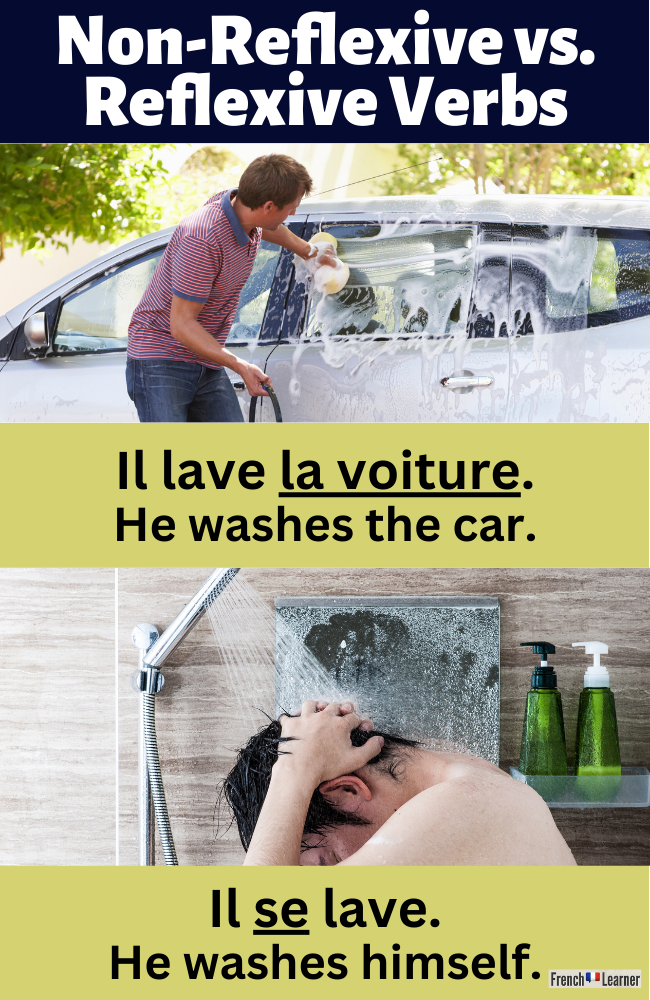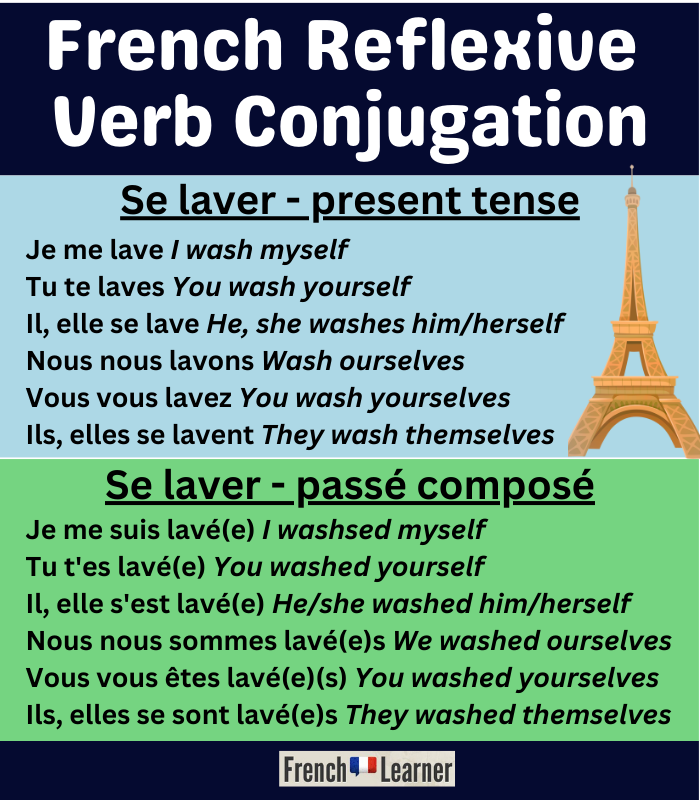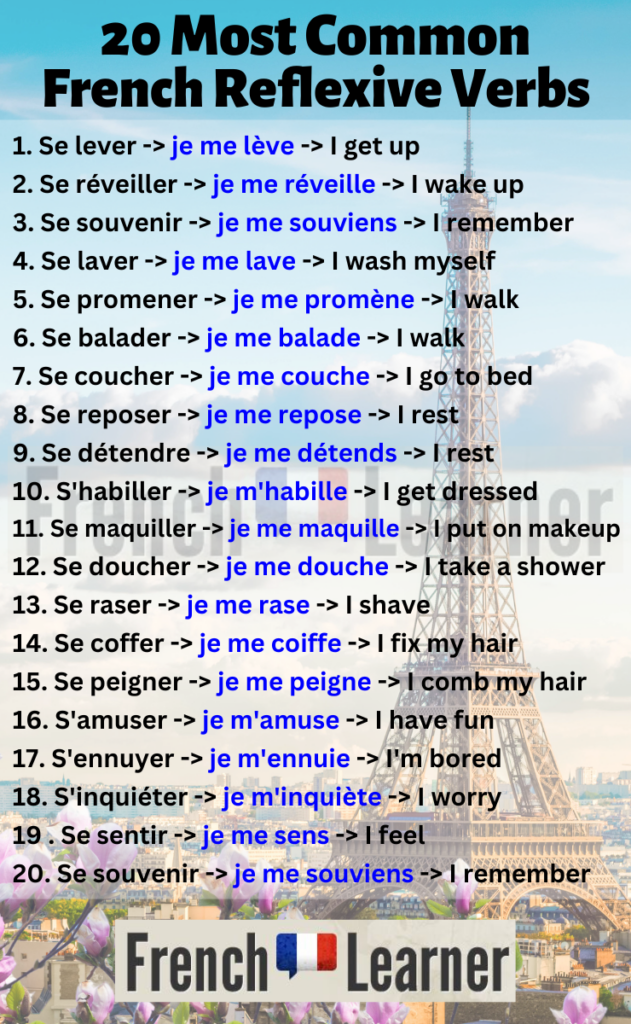French reflexive verbs are verbs where the subject carries out an action onto itself. For example, je me lave le visage (I wash my face). Understanding how these verbs work is essential. On this lesson you’ll learn how to conjugate reflexive verbs and how to use them in spoken French.

French reflexive verbs
Reflexive verbs (verbes pronominaux or réflechis in French) are verbs where the subject and object are the same. These are the “to myself” verbs. For example, Je me lave means “I wash myself”. Reflexive verbs always have a reflexive pronoun (me, te, se, nous, vous, se) between the subject and the verb.
In the non-reflexive form, Je lave la voiture means “I wash the car”. This a standard “subject, verb, object” sentence.

However, when the verb is reflexive, Je me lave means “I wash myself”. The me is the pronominal pronoun and indicates “to myself”. The action of “laver” is reflected back on the subject (je).
French Reflexive verb conjugation
The following verb is an example of a French reflexive verb. The se in front of laver on the infinitive form indicates that the verb is reflexive. All French reflexive verbs have a se on the infinitive.
We have underlined the reflexive pronouns. Both nous nous and vous vous can cause some confusion. The first nous is the subject “we”. The second nous is the reflexive pronoun “to ourselves”. Therefore, Nous nous lavons means “we wash ourselves”.
Se laver = to wash your/one’s self
- Je me lave (I wash myself)
- Tu te laves (you wash yourself)
- Il, elle se lave (he, she washes his/herself)
- Nous nous lavons (we wash ourselves)
- Vous vous lavez (you wash yourselves)
- Ils, elles se lavent (they wash themselves)

Negation rules
To negate a reflexive verb, wrap ne…pas around both the reflexive pronoun and verb. The nous ne nous can cause confusion. To say this smoothly, first say nous ne nous then say the rest of the verb.
- Je ne me lave pas (I don’t wash myself)
- Tu ne te laves pas (You don’t wash yourself)
- Il, elle, on ne se lave pas (He, she doesn’t wash him/herself)
- Nous ne nous lavons pas (We don’t wash ourselves)
- Vous ne vous lavez pas (You don’t wash yourselves)
- Ils, elles ne se lavent pas (They don’t wash themselves)
Reflexive verbs passé composé conjugation
French reflexive verbs in the passé composé require the use of être (to be) as the auxiliary verb. This is because these verbs are non-transitive where the subject and object are the same.
Similar to the list of verbs of Vandertramp verbs of movement which take être in the passé composé, the past participle must agree in gender and number with the subject.
- Je me suis lavé(e) (I washed myself)
- Tu t’es lavé(e) – (You washed yourself)
- Il/elle s’est lavé(e) – (He, she washed him/herself)
- Nous nous sommes lavé(e)s (We washed ourselves)
- Vous vous etes lavé(e)(s) (You washed yourselves)
- Ils/elles se sont lavé(e)s (They washed themselves)
When a direct object follows the reflexive verb there’s no need to make the agreement on the past participle. For example:
- Elle s’est lavé les mains. She washed her hands.
In the negation wrap ne pas around the reflexive pronoun and the auxiliary verb.
- Je ne me suis pas levé(e) – I didn’t wash myself
- Tu ne t’es pas levé(e) – you didn’t wash yourself
- Il/elle ne s’est pas levé(e) – he, she didn’t wash him/herself
- Nous ne nous sommes pas levé(e)s – we didn’t wash ourselves
- Vous ne vous êtes pas levé(e)(s) – you didn’t wash yourselves
- Ils/elles ne se sont pas levé(e)s – they didn’t wash themselves
Modal verbs and infinitives
When a modal verb (such vouloir, to want) precedes and infinitive, the reflexive pronoun remains next to the verb. To negate these sentences, wrap ne…pas around the modal verb.
Other examples of modal verbs are aller (going to), pouvoir (able to, can), and avoir besoin de (to need to).
- Je veux me raser. I want to shave.
- Tu vas te brosser les dents. You’re doing to brush your teeth.
- Vous ne voulez pas vous coucher. You don’t want to go to bed.
- Ils ne peuvent pas chanter la chanson. They can’t sing the song.
Top 20 most common French reflexive verbs

List of French reflexive verbs: daily routine
Almost all daily routine verbs in French are reflexive. These are actions we do to ourselves. For example, Je me maquille (I put on makeup). This page on our site covers daily routine vocabulary in detail.
- se brosser les cheveux to brush one’s hair
- se brosser les dents to brush one’s teeth
- se couper/se limer les ongles to cut/file one’s nails
- se déshabiller to get undressed
- s’endormir to fall asleep
- s’habiller to get dressed
- se laver to wash up
- se laver la figure to wash one’s face
- se laver la tête to wash one’s hair
- se laver les mains to wash one’s hands
- se lever to get up
- se coucher to go to bed
- se maquiller to put on makeup
- se peigner to comb one’s hair
- se raser to shave
- se reposer to rest
- se détendre to rest
- se sécher les cheveux to dry one’s hair
- se coiffer to fix one’s hair
- se doucher to take a shower
Example sentences using French daily routine reflexive verbs
The following example sentences use daily route reflexive verbs.
- Je me brosse les dents deux fois par jour. I brush my teeth daily.
- Elle se maquille avant d’aller au travail. She puts on make up before going to work.
Reflexive verbs of motion
Many verbs of motion in French are reflexive. Again, this is because the subject and object of the verb are the same.
For example, Je me promène en ville means “I go for a walk downtown”. In this sentence je is both the subject and the object. I am not doing anything “to” the city.
Here are a complete list of motion verbs.
- se balader to walk around, stroll
- se diriger vers to head towards
- se lever to stand up
- se mettre debout to stand up
- se promener to take a walk, stroll
- s’approcher de to approach
- s’arrêter to stop
- s’assesoir to sit down
- s’installer to move in, settle down
- s’éloigner de to move away from
Reflexive Verbs of emotion
Verbs of emotion are also reflexive. Again, this is because the action of verb is being reflected back onto the subject. For example, “Je m’amuse à Paris“ means “I’m having fun in Paris”. I’m not doing anything “to” Paris and I’m talking about myself.
Here’s a complete list of reflexive verbs of emotion:
- s’amuser to have fun
- s’animer to feel lively, get excited
- se calmer to calm down
- s’embêter to get/be bored, bothered, annoyed
- s’énerver to get upset, bothered
- s’ennuyer to get/be bored
- se fâcher to get angry
- s’impatienter to get impatient
- s’inquiéter to worry
- se mettre en colère to get angry
- s’offenser to get offended, insulted
- se passionner to get excited
- se préoccuper to worry
- se sentir to feel
- s’effrayer to get scared
Here are some example sentences of reflexive verbs of emotion:
- Je m’inquiète de toi. I’m worried about you.
- Je me sens un peu fatigué. I feel a bit tired.
- Pourquoi est-ce que tu t’énerves si facilement? Why to you get worked up so easily?
Reciprocal reflexive verbs
Reciprocal reflexive verbs are verbs which describe two or more people carrying out the action of the verb onto each other.
This is the French way of saying “to each other”. The only forms used for these verbs are plural: on (for we), nous, vous and ils/elles.
An example of a reciprocal pronominal verb is se rencontrer (to meet each other. The plural forms appear in bold.
The je and tu forms don’t make any sense for these kinds of verbs. For example, Je me rencontre would mean “I meet myself”.
- Je me rencontre
- Tu te rencontres
- Il, elle, on se rencontre (We meet each other)
- Nous nous rencontrons (We meet each other)
- Vous vous rencontrez (You meet each other)
- Ils, elles se rencontrent (They meet each other)
The following is a list of commonly used reciprocal reflexive verbs:
- s’aider to help each other
- se comprendre to understand each other
- se connaître to know each other
- se détester to hate each other
- se donner rendez-vous to set up an appointment to meet each other
- s’écrire to write each other
- se mentir to lie to each other
- se parler to speak to each other
- se quitter to leave each other, part ways
- se regarder to look at each other
- se ressembler to look alike
- se téléphoner to call each other
- se voir to see each other
Here are some example sentences:
- Ils s’aiment depuis le lycée. They’ve loved each other since high school.
- Nous nous marions en juillet. We’re getting married in July.
Passive reflexive verbs
Passive reflexive verbs are used to create a passive voice. English equivalents would be “is eaten” or “is pronounced”.
In the infinitive form, a passive reflexive is made by putting a “se” before an infinitive. For example, se faire means “is done”.
In the conjugated form, both the third-person singular and third-plural are used. For example, Ça ne se mange pas avec les mains translates literally to “That’s not eaten with your hands” but means “You don’t eat that with your hands.”
Here is a list of common passive reflexive verbs:
- se dire is said
- se faire is done
- se manger is eaten
- se boire is drank
- se prononcer is pronounced
- se traduire is translated
- se voir shows
- se lire is read
- s’écrire is written
- se vendre is sold
- s’acheter is purchased
- s’utiliser is used
Here are some example sentences with passive reflexive verbs:
- Ça se boit chauffé. That’s drank heated.
- Ça s’écrit avec un s. That’s written with an -s.
Subjective reflexive verbs
This last category of reflexive verbs is called “subjective” reflexives. This is because the verbs just happen to be reflexive for no particular reason. Here’s a list of common subjective reflexive verbs:
- s’en aller to go, leave, to be off
- se souvenir to remember
- se rappeler to recall
- se rendre compte de to realize
- se passer to happen
- s’attendre to expect
- s’apercevoir de to realize
- se demander to wonder
- s’interesser a to be interested in
- s’habituer à to get used to
Here are some example sentences of subjective reflexive verbs:
- Salut tout le monde! Je m’en vais! Bye everybody! I’m leaving!
- Je me demande pourquoi il ne vient pas. I wonder why he isn’t coming.
Verbs with meaning changes
Some French verbs have meanings that change completely between the reflexive and non-reflexive forms.
For example, in the non-reflexive form, dépêcher means to dispatch. In the reflexive form, se dépêcher means to hurry.
Another example is the verb tromper. In the non-reflexive form, tromper means to cheat or swindle. In the reflexive for, se tromper de means to mistaken. Pardon, je me trompe de votre prenom (Sorry, I’m mistaking your first name”.

